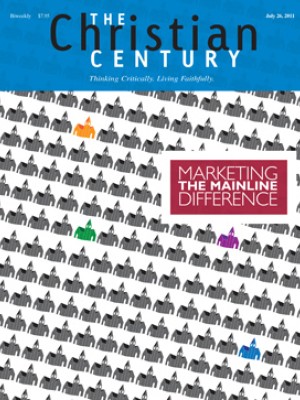Can creedless Unitarians make it another 50 years?
A recent Sunday service at the First Unitarian Church of Baltimore
ended with an apology. Laurel Mendes explained that religious doctrine
had been duly scrubbed from the hymns in the congregation's Sunday
program. But Mendes, a neopagan lay member who led the service, feared
that a reference to God in "Once to Every Soul and Nation" might upset
the humanists in the pews.
"I didn't want to make anyone
uncomfortable by reciting something that might be considered a
profession of faith," said Mendes, 52, after the service. "We did say
'God,' which you don't often hear in our most politically correct
hymns."
Such remarks are typical in the anything-but-typical
Unitarian Universalist Association, a liberal religious movement with
a proud history of welcoming all seekers of truth—as long as it's
spelled with a lowercase t. For 50 years the Boston-based UUA has
conducted a virtually unprecedented experiment: advancing a religion
without doctrine, hoping that welcoming communities and shared political
causes, not creeds, will draw people to their pews.
Read our latest issue or browse back issues.
Leaders say
its no-religious-questions-asked style positions the UUA to capitalize
on liberalizing trends in American religion. But as the UUA turns 50
this year, some members argue that a midlife identity crisis is
hampering outreach and hindering growth. In trying to be all things to
everyone, they say, the association risks becoming nothing to anybody.
The
UUA does promote seven largely secular principles that emphasize human
dignity and justice. Membership in the UUA dipped in 2011 for the third
consecutive year to 162,800, a loss of about 1,400 members. The number
of congregations fell by two to 1,046.
The UUA was formed in 1961
by the merger of two small historic groups: Unitarians, who believe in
one God, rather than Christianity's traditional Trinity; and
Universalists, who hold that God's salvation extends to all, regardless
of race, creed or religion.
Nearly 4,000 Unitarian Universalists
gathered in Charlotte, North Carolina, June 22–26 for the association's
annual assembly, where they celebrated their golden anniversary with
hymns, remembrances and a large cake.
As usual, progressive
politics prevailed, with pledges for an "institutional commitment" to
ethical eating, an antidiscrimination rally and a special collection
taken for ministry to immigrants. Such activism dates to 19th-century
Unitarian godfather William Ellery Channing, who argued that the aim of
religious life is to encourage public virtue.
"That sense that
religion must be practical and influence the moral and spiritual context
in which we live remains absolutely central to Unitarian Universalism
today," said John Buehrens, a former president of the UUA.
Like
the UUA, one in four Americans sample from a variety of faith
traditions, according to a 2009 survey by the Pew Forum on Religion
& Public Life. A separate Pew survey found that 65 percent believe
that multiple religious paths can lead to eternal life.
"There has
certainly been an increase in the amount of people who are open to the
kind of ideas the Unitarian Universalists have championed," said John
C. Green, a political scientist who worked on the Pew studies and has
studied the UUA. "Whether they can convert that into members joining
them is an open question. But the opportunity is certainly there."
Peter
Morales, the UUA's current president, calls those trends, as well as
the exodus of Americans from most Christian denominations, "an amazing
opportunity."
"Millions of people are actively seeking a
progressive, nondogmatic spiritual community," he said. "Our challenge
is to be the religious community that embraces those people."
But
some say the UUA is held back by members' reluctance to proclaim
religious tenets—a tricky task for an association that includes
Christians, Buddhists, Jews, pagans, humanists and spiritual refugees
from a host of more dogmatic faiths. Many UUA members say they find
meaning and purpose in the familial bonds forged in
congregations—regardless of religious beliefs.
David Bumbaugh, a
professor of ministry at the UUA's Meadville Lombard Theological School
in Chicago, was present at the founding of the association in 1961. He
says the UUA has always shied away from God-talk for fear of offending
members and shattering congregations.
But Bumbaugh has made the
rounds recently at regional UUA conferences, encouraging them to
publicly wrestle with foundational questions. "What do we believe? Whom
do we serve? To whom or what are we responsible? Those are the questions
with which every viable religious movement must wrestle," Bumbaugh has
said. "So long as those essential questions remain unaddressed, the
dream will remain unfulfilled."
An internal UUA report from 2005
suggested that more than dreams could die. The whole association could
collapse if members continue to muffle religious discussion, the report
said. "The consensus of experts from an array of fields—from
organizational development to systematic theology—is that to grow
effectively, a religious organization needs clearly defined boundaries,"
the report states. "And one cannot put even the most permeable boundary
around nothing." —RNS






